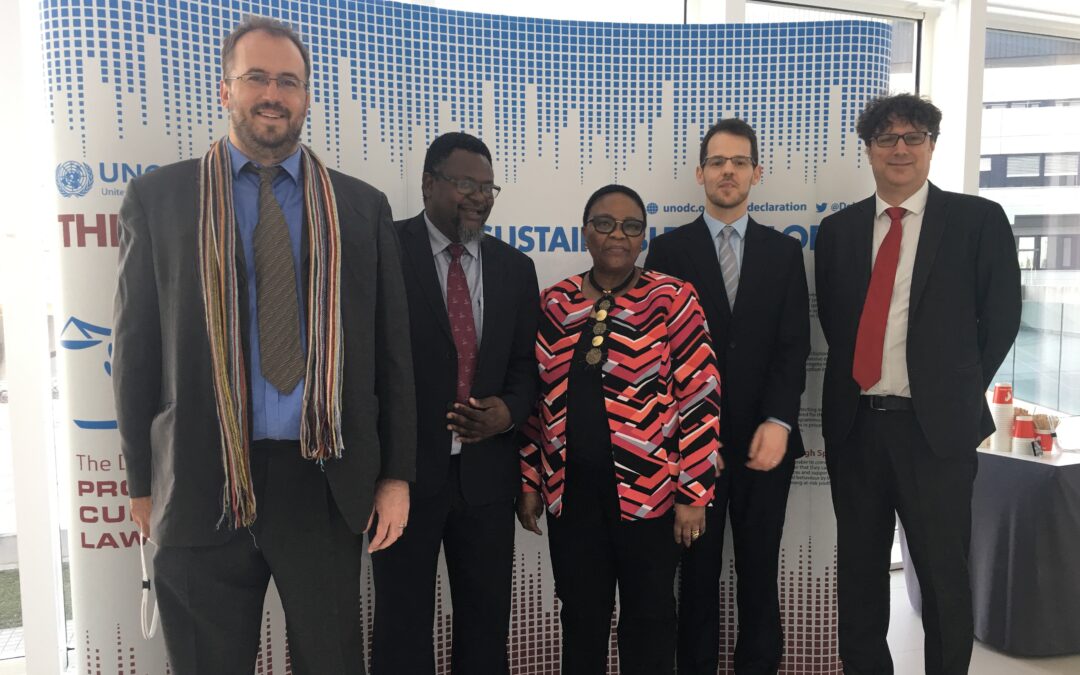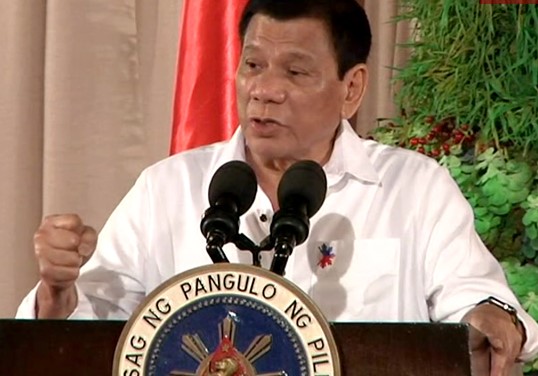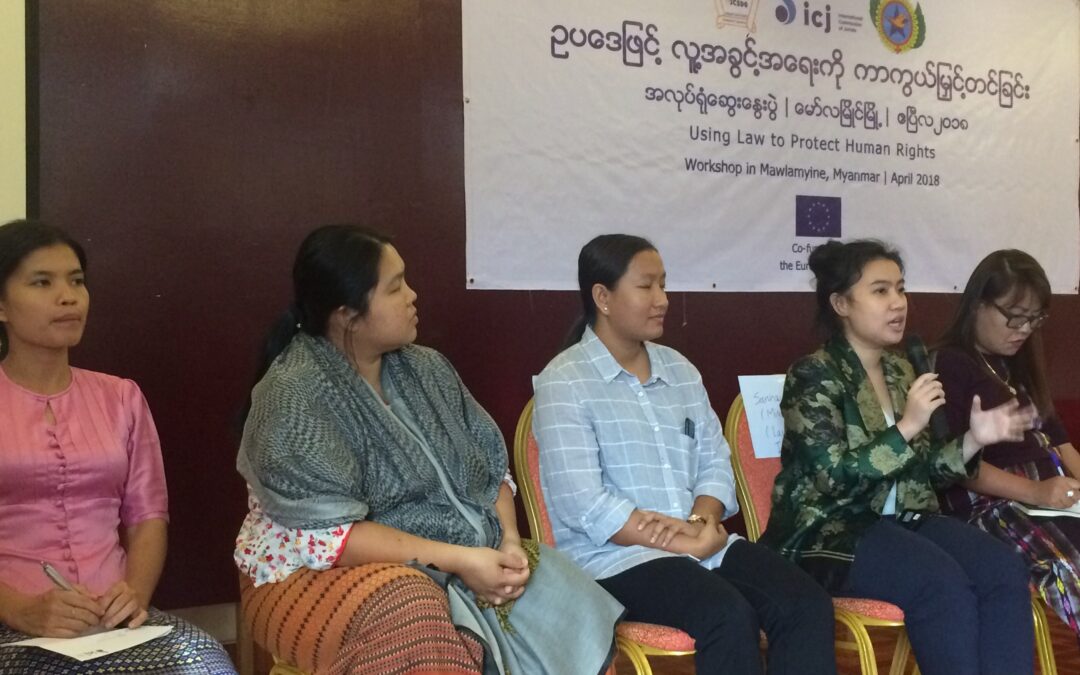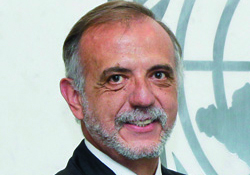
Apr 12, 2018 | Artículos, Noticias, Publicaciones
Hoy la CIJ lanza su informe El juzgamiento de civiles por tribunales militares en Venezuela.
El informe analiza el marco constitucional y legal de la jurisdicción penal militar de Venezuela, su estructura, composición y competencia.
Igualmente, el informe aborda los graves problemas de independencia de la jurisdicción penal militar venezolana y la práctica del enjuiciamiento de civiles por los tribunales militares de ese país, a la luz de estándares internacionales y de los principios del Estado de Derecho.
Asimismo el informe relaciona las recomendaciones sobre administración de justicia por tribunales militares que han venido formulando a Venezuela distintos órganos y procedimientos internacionales de protección de los derechos humanos, tanto en el ámbito de las Naciones Unidas como del Sistema Interamericano.
Finalmente, el informe concluye que los tribunales militares venezolanos no satisfacen las condiciones necesarias e inherentes a una recta administración de justicia, establecidas por el artículo 14 del Pacto Internacional de Derechos Civiles y Políticos, y que el juzgamiento de civiles por tribunales militares configura una violación flagrante de los derechos a un tribunal independiente, imparcial y competente y es incompatible con las normas y estándares internacionales sobre administración de justicia.
Venezuela-Civiles Tribunales Militares-Publications-Reports-Thematic Reports-2018-SPA (el informe, en PDF)

Apr 10, 2018 | News
The ICJ and its partner the Democracy Governance and Rights Unit (DGRU) of the University of Cape Town are holding a panel discussion on selection and appointment of judges within the auspices of the Launch of the Global Judicial Integrity Network.
This new Network is being launched by the UN Office on Drugs and Crime (UNODC) in Vienna, Austria on today.
The panel is aimed at discussing the implementation and monitoring of guidelines on the best practice for the appointment of judges (“guidelines”).
The Southern Africa Chief Justices’ Forum (SACJF) mandated the development of these guidelines through its Concluding Communiqué during the 2015 Annual Conference of East and Southern Africa Chief Justices, held at Victoria Falls in Zimbabwe.
The ICJ and the DGRU have been working on developing the guidelines, together with a subcommittee of the SACJF, with the aim of seeing them adopted at the SACJF’s annual general meeting to be held this year between August and September in Malawi.
“The UNODC Judicial Integrity Network launch in Vienna, Austria 9-10 April 2018 gives us an excellent opportunity to start thinking a bit further down the line, and identify, anticipate and develop responses to problems that may be experienced in implementing the guidelines at a national level,” said Arnold Tsunga, Africa Director of the ICJ.
While many very good standards have been developed and adopted in Africa in the field of human rights, rule of law, and good governance, a major challenge has been to see the standards implemented in practice.
“In addition to highlighting relevant global standards, the ICJ will also present its experiences from around the world in monitoring and overcoming obstacles to implementation of such guidelines,” said Matt Pollard the Director of the Centre for Independence of Judges and Lawyers at the ICJ.
“This should contribute to planning for effective implementation of the Southern African guidelines, and be of interest to the broader audience at the launch of the UNODC global network on judicial integrity.”
The panel to be moderated by Arnold Tsunga includes Hon. Sanji Monageng, ICJ Commissioner and Justice, International Criminal Court; Mr. Jan van Zyl Smit, Associate Senior Research Fellow, Bingham Centre for the Rule of Law; Mr. Christopher Oxtoby, Senior Researcher, Democratic Governance and Rights Unit, University of Cape Town; Mr Matt Pollard, Senior Legal Adviser and Director, CIJL, ICJ.
Fore more information contact Arnold Tsunga on arnold.tsunga@icj.org (+27716405926) or Matt Pollard on <matt.pollard@icj.org> (+41 79 246 54 75)
Universal – Vienna Panel on Selection – News – Webstory – ENG – 2018 (Further information in PDF)

Apr 10, 2018 | News
The ICJ today condemned a threatening statement made by Philippine President Rodrigo Duterte attacking Chief Justice Maria Lourdes Sereno of the Philippines Supreme Court.
The ICJ said that the President’s remarks constituted an assault not just on the Chief Justice, but on the independence of the judiciary in the country.
The ICJ urged President Duterte to respect judicial independence and not to exert political pressure on any government official or agency to undermine the independence of the judiciary.
In a press conference on 9 April 2018, President Duterte told reporters: “I’m putting you on notice that I’m your enemy and you have to be out of the Supreme Court.”
He also called on the House of Representatives to expedite impeachment proceedings presently underway against Chief Justice Sereno.
“It is absolutely unacceptable for President Duterte to make such a statement not only because it constitutes direct intimidation of the Chief Justice, but the chilling effect it may have on other independent judges who carry out their professional duties,” said Emerlynne Gil, Senior International Legal Adviser of ICJ.
“By expressing his personal feelings against the Chief Justice and by directing the House of Representatives to accelerate the impeachment proceedings, the President is actively influencing and interfering with the functions of other co-equal branches of government,” Gil added.
The ICJ reminds President Duterte that as enunciated in the UN Basic Principles on the Independence of the Judiciary, “[i]t is the duty of all governmental and other institutions to respect and observe the independence of the judiciary.”
The Principles affirm that the judiciary must be able to carry out its work “without any restrictions, improper influences, inducements, pressures, threats or interferences, direct or indirect, from any quarter or for any reason.”
The ICJ strongly urges President Duterte to retract his comments and to refrain in the future from making any statements attacking individual judges or in any way interfering with the independence of the judiciary.
Contact
Emerlynne Gil, Senior International Legal Adviser, t: +662 619 8477 (ext. 206) ; e: emerlynne.gil@icj.org.
Background
In September 2017, two impeachment complaints against the Chief Justice were filed before the Committee of Justice of the House of Representatives, the Lower House of Congress.
The Committee of Justice approved only one of the complaints, which is scheduled to be put before the plenary of the House of Representatives in May 2018 when Congress resumes its session.
If it obtains one-third vote of all members in the House of Representatives, the articles of impeachment will be transmitted to the Senate, which is the Upper House of Congress.
Any impeachable officer may be removed from office by a vote of two-thirds of all the members of the Senate sitting as the impeachment court.
Some of the points raised in the approved impeachment complaint are the Chief Justice’s failure to report certain income in her statements of assets, liabilities and net worth (SALN), allegations of use of public funds to finance her extravagant and lavish lifestyle, and manipulation of judicial appointments for personal and political reasons, among others.
The Chief Justice maintains she correctly filed her SALNs. She also further claims that the other allegations in the impeachment complaint are baseless or mere fabrications.
In March 2018, the Philippines’ Solicitor General Jose Calida filed a petition before the Supreme Court questioning the Chief Justice’s appointment due to her alleged failure to fully disclose her wealth. Oral arguments on this petition were made on 10 April 2018.

Apr 9, 2018 | News
Prior to this workshop, on 6 April the ICJ met with the Mon State High Court, including its Chief Justice.
Legal advisers from the ICJ had a constructive discussion with the justices about judicial reform in Myanmar, including the role of lawyers and civil society, as well as jurists, in advancing accountability and access to justice.
The two-day workshop aimed to identify challenges and opportunities for human rights advocacy using law, and to encourage the building of relationships and networks between lawyers and civil society.
The workshop considered strategic litigation concepts and case studies in the region. It also discussed the landscape of rule of law and justice in Myanmar, particularly the experiences regarding access to justice of some sixty participants from Mon State.

Apr 4, 2018 | Comunicados de prensa, Noticias
La CIJ está hondamente preocupada ante la falta de independencia de los miembros de la comisión de postulación para la elección de fiscal general.
Desde el 27 de agosto de 2017, cuando el Presidente de la República declaró “persona non grata” al Comisionado de la Comisión Internacional contra la Impunidad (CICIG), Iván Velásquez (foto), el Estado de Derecho de Guatemala viene siendo seriamente afectado por diferentes funcionarios al más alto nivel.
En dicha ocasión, la Corte de Constitucionalidad jugó un papel primordial en la defensa del Orden Constitucional y a favor del rescate del Estado de Derecho, al emitir varias resoluciones que lograron detener las acciones ilegítimas, que intentaron implementar al más alto nivel, el Presidente de la República y las y los diputados del Congreso de la República, para consolidar la impunidad.
En este contexto, se ha llevado a cabo la primera fase de la elección de Fiscal General por parte de la Comisión de Postulación. Informes, como el de la organización “Insight Crime”, señalan que los miembros de la Comisión de Postulación para la elección de Fiscal General, en lugar de actuar para cumplir correctamente con su mandato constitucional y coadyuvar para que el Estado de Guatemala logre alcanzar el bien común, lo hacen únicamente para satisfacer intereses de grupos vinculados al poder político, económico o militar.
Este actuar arbitrario socava el Estado de Derecho y provoca que la ciudadanía en general pierda la credibilidad en las instituciones de justicia y en el Estado de Derecho.
La CIJ considera oportuno recordar, en este momento del proceso de elección de Fiscal General, a los miembros de la Comisión de Postulación, que son funcionarios públicos sujetos a la Constitución Política de la República de Guatemala, a los Convenios internacionales de derechos humanos ratificados por el Estado de Guatemala, a las leyes ordinarias y a las decisiones de la Corte de Constitucionalidad en la materia.
La Constitución prescribe que el nombramiento en empleos o cargos públicos sólo se debe hacer sobre “razones fundadas en méritos de capacidad, idoneidad y honradez” (artículo 133).
En ese contexto, la CIJ recuerda el precedente de la elección de Fiscal General en el año 2010, cuando la Corte de Constitucionalidad ordenó repetir y reiniciar todo el proceso. En dicha oportunidad, varios de los comisionados tuvieron que inhibirse y se retiraron del proceso. Cuatro de dichos comisionados, vuelven a integrar hoy la Comisión de Postulación, lo cual introduce más dudas acerca de la legitimidad del proceso.
La CIJ recuerda que, para la realización de investigaciones independientes e imparciales, que garanticen el acceso a la justicia de las víctimas de los delitos y para romper el círculo de la impunidad, es fundamental que la Fiscalía pueda llevar a cabo su labor de modo independiente, autónomo e imparcial.
En ese sentido la Comisión Interamericana de Derechos Humanos y el Relator de las Naciones Unidas para la Independencia de los Magistrados y Abogados, han señalado que la relación de dependencia que puedan tener la Fiscalía respecto de otros órganos – como el Poder Ejecutivo- puede tener un impacto negativo en su actuación independiente e imparcial, socavar la efectividad de las investigaciones y ser un factor de impunidad.
La CIJ considera que el “pacto de impunidad” que está en marcha, pretende cooptar al Ministerio Público y afectar el buen trabajo que realiza el comisionado Iván Velásquez, a favor de la lucha contra la impunidad.
De llegar a ser electo un o una Fiscal General que no reúna los requisitos establecidos en el artículo 113 de la Constitución, el daño a la sociedad guatemalteca en su conjunto, puede llegar a ser de múltiples dimensiones, difíciles de cuantificar y causar “daños irreparables al sistema de justicia”, por su falta de independencia frente a cualquiera de los tres poderes del Estado o por su compromiso de defender los intereses de grupos del poder político, económico, militar o del crimen organizado.
La CIJ esta hondamente preocupada por el hecho de que exista un potencial conflicto de intereses por parte del Presidente de la República en el proceso de seleción y nombramiento del Fiscal General, toda vez que el primer mandatario ha sido sido cuestionado por su posible involucramiento en el Caso Hogar Seguro, en el que resultaron muertas 41 niñas, hechos que deben ser investigados por el Ministerio Público y además, su hijo y hermano están siendo procesados por casos denunciados por el Ministerio Público y vinculados a la lucha contra la corrupción.
Ramón Cadena, Director de la CIJ para Centro América, expresó: “La decisión final de la Comisión de Postulación deberá estar bien fundamentada y de ninguna manera podrán elegir personas que no reunan las condiciones previstas por el artículo 113 de la Constitución, que generen la más mínima duda con respecto a su independencia, honestidad e idoneidad o que resulten ser parte del pacto de impunidad existente.”









